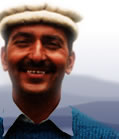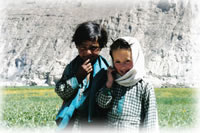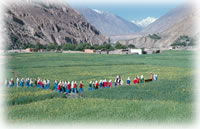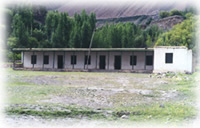 |
 |
||
 |
|||
|
RELATED THEMES development gender migration social change OTHER LOCAL THEMES BACKGROUND |
education
While boys attend the government school, there is an Aga Khan Education Service (AKES) school for girls in Shimshal. Both go from Class 1 to Class 8 and all teachers are from Shimshal. While there are insufficient books and blackboards as well as a shortage of classrooms, it is evident that education in Shimshal is constantly improving in terms of facilities, numbers of teachers and the quality of teaching. People's attitudes have also shifted in recent decades and now it seems almost everyone places great importance on their children's education - although some do face real financial restrictions on achieving this.
Some of the uneducated narrators express their frustration and describe the difficulties they have faced: "When we go down country we don't know the language or the manners, we don't even know how to ask for water. We are like animals because we don't know anything; wherever the educated person goes she doesn't feel [such] problems" (Pakistan 26). The previous Aga Khan (the current Aga Khan's grandfather, who died in 1957) ordered that if an Ismaili family couldn't afford to educate all its children, then the female children must be educated first. Today there are as many female as male students in Shimshal. However, one of the female teachers explains that while she was growing up many were sceptical of female education: "…people used to ask us that boys are getting education to be a pilot or to be an officer, so what do you people do? Are you getting education to go to the moon? They were taunting [us]" (Pakistan 19). Despite the change in attitudes, girls continue to face restrictions in terms of continuing their education beyond secondary level, outside of Shimshal. Despite this wholehearted enthusiasm for education, several narrators suggest a tension between pursuing education and maintaining their agro-pastoral livelihood. For example, all but one of Gulbika's sons are studying or working outside Shimshal and she comments: "Now I observe that the development I made in my fields is being wasted and everything is getting spoiled. But my children get more advantage from their education. Therefore they concentrate on their education" (Pakistan 27). One of the first female teachers (Pakistan 19) explains how she continues to care for her livestock and carry out other traditional female tasks, so as not to isolate herself from other women in the village. Education does take people out of Shimshal, and it is also creating changes within the village, as people place more and more emphasis on education compared to agriculture and livestock. However, several narrators argue that education can be useful within Shimshal in terms of improving farming; in other words education doesn't have to signify a departure from the village. The Environmental Education Programme (EEP) is a community initiative to make education more relevant to life in Shimshal. Through the EEP children are encouraged to research and learn about their own surroundings. For several of the narrators, their journey through education is a very significant part of their life history and they describe this in detail. For many continuing their education was the reason for them leaving Shimshal for the first time - a significant experience in itself! quotes about education"At the moment people are taking an interest in education. When I first joined the school and became a teacher, parents used to take their children back to their houses for work to assist them. But now parents are sending their children to school regularly, so it shows that there is a big change in the attitude of people… There are differences, for example, those people who have many yaks, and a big herd and a lot of land, their children are not so active in education… But those people who have a family member or two who are well educated, all the children are registered and they attend school."
"It is indeed the period of knowledge and information. Everyone must get education. But they must not abandon their culture and traditions. The educated people should not criticise these traditions by saying that these are outdated and old things. They will be useful for the new generation in the future." "…before going to the Ali Institute I used to force my students to learn everything by heart. Now I think that we cannot memorise everything. But the best way or the best approach would be to let the student experience and when they will experience something it means they will remember it forever. They will really learn." "We tried to educate children through the EEP (Environmental Education Programme), showing how science and education is out there in their own village and they can learn from their surroundings. Otherwise…the school curriculum talks about the urban areas and things like trains, cars or Lahore, which have no relevance to a child's daily life here. They feel education is out there in the cities, but we tried to give them a new outlook on their own surroundings and life." "What can I think about the education of my children, poverty is the main hindrance - I cannot afford the educational expenses of my children. I picked my elder son from school just for the reason that I was no longer able to travel as a porter and earn money. Now he treks with tourists and earns money, which meets our day to day expenses." "…what I dislike is that these young boys from the village…leave their education and carry loads for foreigners… I dislike it, because education is the first priority for life, it is a basic thing. In our time there was no education (formal schooling in the village) and this was our need. Right now I say no to my son. I tell him to go to Islamabad for studying and don't go to the mountain." "…if I had taken my children to Pamir probably they would have not concentrated on their education because they would have assisted with the yaks and livestock herding. The livestock herding would have deprived them from getting education. People would admonish me for living in the village (ie not going to Pamir) but I think that was the better decision for my children's education to stay in my village. This was the reason that I cannot go to Pamir and stay in the village." "…if students can collect simple data [through the EEP] and try to understand these different aspects of Shimshal life. They will understand what Shimshal life means, or they will start respecting that their surroundings…because usually this curriculum here, they don't mention…anything from your surroundings…" |
|
 Formal education is a major topic throughout the testimony collection. It is recognised by many as playing a key role in Shimshal's development and along with migration can be considered an important force for social change. Three testimonies particularly focus on education (Pakistan 1, 12 and 19). These narrators are all teachers and so they describe the general situation of education in Shimshal as well as their own personal experiences. All three sacrificed their own ambitions to receive a higher education outside the area in order to become teachers in Shimshal and invest in the education of the next generation. Khaliq, head teacher of the girls' school, explains:
Formal education is a major topic throughout the testimony collection. It is recognised by many as playing a key role in Shimshal's development and along with migration can be considered an important force for social change. Three testimonies particularly focus on education (Pakistan 1, 12 and 19). These narrators are all teachers and so they describe the general situation of education in Shimshal as well as their own personal experiences. All three sacrificed their own ambitions to receive a higher education outside the area in order to become teachers in Shimshal and invest in the education of the next generation. Khaliq, head teacher of the girls' school, explains:  Daulat Amin was Shimshal's first teacher and can thus be considered responsible for the first generation of educated Shimshalis, including several of the men interviewed. One woman explains,
Daulat Amin was Shimshal's first teacher and can thus be considered responsible for the first generation of educated Shimshalis, including several of the men interviewed. One woman explains,  The change in attitudes is largely a result of the Aga Khan's emphasis on education, so it can in effect be considered part of Ismaili faith. But also, Shimshalis have now seen a generation become educated - some up to MA/MSc level. This educated generation is in a position to teach others, contribute to village development and enjoys a certain status within the community. Even those narrators who are uneducated themselves talk about their commitment to educating their own children. Shafa, a farmer, states:
The change in attitudes is largely a result of the Aga Khan's emphasis on education, so it can in effect be considered part of Ismaili faith. But also, Shimshalis have now seen a generation become educated - some up to MA/MSc level. This educated generation is in a position to teach others, contribute to village development and enjoys a certain status within the community. Even those narrators who are uneducated themselves talk about their commitment to educating their own children. Shafa, a farmer, states: